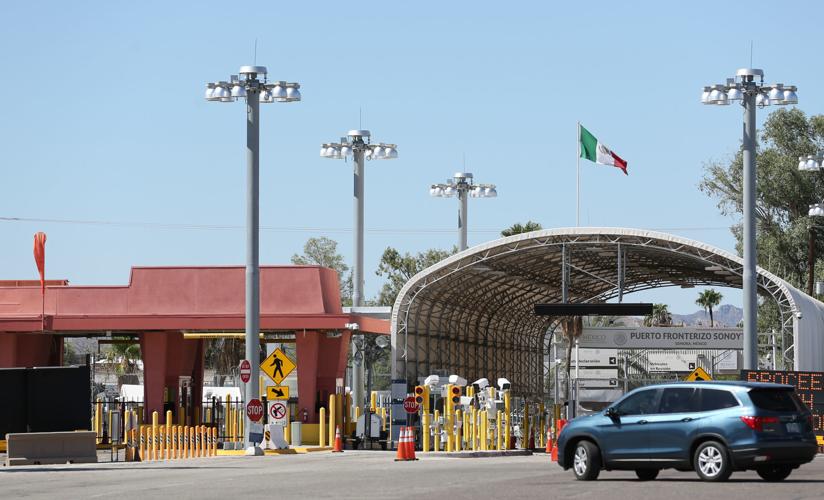SAN CARLOS, Sonora — Mexican authorities are closing the U.S-Sonora border to nonessential travel this holiday weekend, when Arizonans would normally flock to Mexican beach towns like Rocky Point and San Carlos for the Fourth of July.
Starting Saturday, July 4, southbound travelers without essential business in Sonora will be turned away at border checkpoints in Nogales, Agua Prieta and San Luis Rio Colorado, said Sonora Gov. Claudia Pavlovich’s office. The governor did not specify an end-date for the border closure.
Officials made a last-minute to allow limited passage through the Lukeville/Sonoyta crossing, but only for travelers with proof of a confirmed reservation at a Rocky Point hotel or resort certified in proper COVID-19 protocol.
Citing surging COVID-19 cases in Arizona, Pavlovich said in a news release that the closure aims to stop tourists from spreading the novel coronavirus in the already stressed Mexican state.
“We are all going to be on alert at this time to prevent them from coming, whether they are Mexicans living in the U.S., Americans or those who want to come to spend the weekend and put a greater burden on us regarding COVID,” Pavlovich said in the release.
Travelers will be allowed to cross for essential activities, including commerce, work activities or acquisition of medicine and health services, according to the governor’s office.
The U.S. implemented similar limits on northbound travel in March, when it closed the border to nonessential travel. U.S. citizens returning to the States are permitted to cross under the U.S. Customs and Border Protection order establishing the border restrictions. The order has been extended to July 21.
HOSPITALS STRESSED IN SONORA
In Sonora, there are more than 9,000 confirmed COVID-19 cases. State health officials have warned that hospitals in Nogales and Guaymas — which includes popular beach resort San Carlos — have already reached their capacity.
Earlier this week, Sonoran Health Secretary Enrique Clausen pressed state and federal authorities to close the U.S.-Sonora border in the face of Arizona’s uncontrolled outbreak of COVID-19 and rising cases in Sonora.
On Wednesday alone, Arizona recorded nearly 4,900 new cases of COVID-19 — a record high for the state’s daily case count. Arizona now has 87,425 total confirmed cases of COVID-19, state health data say. That’s a sixfold increase from mid-May, when the state’s stay-at-home order expired and shuttered businesses began reopening.
On Monday, Arizona Gov. Doug Ducey issued an executive order reclosing bars, movie theaters, gyms and other businesses, in an effort to slow the spread of the virus. Ducey is urging all Arizonans to stay home whenever possible and to wear a mask in public.
Ducey spokesman Patrick Ptak said in a Thursday email that the governor’s office is in regular contact with Sonoran officials.
“The governor has been clear: You are safer at home,” he said. “He encourages all Arizonans to stay home, and that includes avoiding unnecessary travel as both Arizona and our partners in Sonora manage this crisis.”
BEACH TOWNS IN TOUGH SPOT
For San Carlos Comisario Enrique Gamez, the governor’s move to close the northern border is a relief.
“She should have done it a long time ago,” said Gamez, who acts as a liaison between San Carlos residents and the Guaymas mayor’s office. “We wouldn’t be the way we are right now. Our cases are increasing really bad.”
But in Puerto Peñasco, also known as Rocky Point, news of the border closure came as a crushing disappointment for the tourism sector, said Hector Vazquez, president of Puerto Peñasco’s Office of Conventions and Visitors.
The popular beach town, where there are only 21 confirmed COVID-19 cases, recently reopened to tourists. While beaches, bars and nightclubs remain closed, restaurants, resorts and outdoor attractions reopened with strict health protocols. A health checkpoint at the city’s entrance, where tourists get their temperature taken and are sprayed with a disinfectant.
“It costs money to close (the economy), it costs money to reopen, and now this,” Vazquez said in a Thursday interview on the border closure. “It’s very upsetting.”
Puerto Peñasco Mayor Kiko Munro said last week that, despite the health risks, the city had no choice but to reopen the economy or face “starvation and social chaos.”
In Sonora, beaches have been closed since March to deter tourists from visiting and to discourage social interaction. But in San Carlos, enforcement of the beach closures has been lax, and restaurants that are required to offer only limited seating have been packed with people, Gamez said.
That will change this weekend, Gamez said. He said he reported the apparent restaurant violations to state health officials, who will conduct inspections this weekend and impose fines or shut down violators. Also this weekend, a heightened police presence will restrict access to beaches and issue fines to those who defy the closures. The checkpoint at the entrance to San Carlos will allow passage only to those who can prove they live there, Gamez said.
“We want the cases to go down so we can go back to work,” Gamez said. “If everybody would have understood before, by now we could be back to normal.”
Vazquez emphasized that Puerto Peñasco still welcomes tourists who are already in Mexico, as well as foreigners who get on the road before the border closes Saturday. He said Peñasco officials are asking the state to allow international tourists to visit Rocky Point.
“I hope Gov. Pavlovich reconsiders, at least for Puerto Peñasco. They need to look at Peñasco as a good example of how to reopen the economy,” Vazquez said. “We don’t have a vaccine, we don’t have medicine. We need to understand and live with the virus. The only way we can live with that virus is by complying with all the (health) protocols.”





